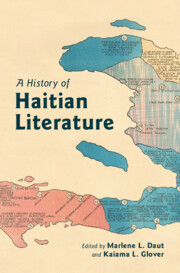Book contents
- A History of Haitian Literature
- Additional material
- A History of Haitian Literature
- Copyright page
- Contents
- Figures
- Contributors
- Chapter 1 Editors’ Introduction
- Chapter 2 Literature as Loot
- Chapter 3 Theater in Early Independent Haiti
- Chapter 4 “So all the world may know it”
- Chapter 5 Civil War, Guerre de Plume, and the Emergence of Early Haitian Periodical Culture
- Chapter 6 History, Politics, and Revolutionary Romanticism in Charles Hérard-Dumesle’s Voyage dans le nord d’Hayti (1824) and the Anonymously Published L’Haïtiade (ca. 1826)
- Chapter 7 The Cénacle and the Sacred
- Chapter 8 Émeric Bergeaud’s Stella
- Chapter 9 The Predicament of Civilization
- Chapter 10 The Politics of Disenchantment
- Chapter 11 Haitian Poetry in Creole
- Chapter 12 Some Causes of the Underdevelopment of Haiti’s Creole-Language Literature
- Chapter 13 Performing Rebellion and Re-membering Haiti’s Past and Present in Twentieth-Century and Contemporary Theater
- Chapter 14 Haitian Writers and the Forging of a National Voice through Periodicals in the Twentieth Century
- Chapter 15 “Arrêtez le monde! Je veux rêver”
- Chapter 16 Occupation-Era Literature in Haiti
- Chapter 17 Haitian Literature and the Dominican Republic
- Chapter 18 Marxism and the Moun Andeyo
- Chapter 19 Jacques Roumain, from Indigenism to Nationalism
- Chapter 20 For a History of the Novel of Haitian Tradition
- Chapter 21 Exile and Twentieth-Century Haitian Writing
- Chapter 22 The Zonbi as Episteme in Haitian Prose Fiction
- Chapter 23 Living Vodou
- Chapter 24 Papa Loko’s Dire Poétique in Twenty-First-Century Port-au-Prince-Based Haitian Poetry
- Chapter 25 Partisan Politics and Twentieth-Century Fictions of the Haitian Revolution
- Chapter 26 Haitian Women’s Fiction
- Chapter 27 Haitian Uses of the Erotic
- Chapter 28 Archiving Narratives of Maternal Loss and Queer Life in Haitian Fiction in the Wake of the 2010 Earthquake
- Index
Chapter 24 - Papa Loko’s Dire Poétique in Twenty-First-Century Port-au-Prince-Based Haitian Poetry
Published online by Cambridge University Press: 07 November 2024
- A History of Haitian Literature
- Additional material
- A History of Haitian Literature
- Copyright page
- Contents
- Figures
- Contributors
- Chapter 1 Editors’ Introduction
- Chapter 2 Literature as Loot
- Chapter 3 Theater in Early Independent Haiti
- Chapter 4 “So all the world may know it”
- Chapter 5 Civil War, Guerre de Plume, and the Emergence of Early Haitian Periodical Culture
- Chapter 6 History, Politics, and Revolutionary Romanticism in Charles Hérard-Dumesle’s Voyage dans le nord d’Hayti (1824) and the Anonymously Published L’Haïtiade (ca. 1826)
- Chapter 7 The Cénacle and the Sacred
- Chapter 8 Émeric Bergeaud’s Stella
- Chapter 9 The Predicament of Civilization
- Chapter 10 The Politics of Disenchantment
- Chapter 11 Haitian Poetry in Creole
- Chapter 12 Some Causes of the Underdevelopment of Haiti’s Creole-Language Literature
- Chapter 13 Performing Rebellion and Re-membering Haiti’s Past and Present in Twentieth-Century and Contemporary Theater
- Chapter 14 Haitian Writers and the Forging of a National Voice through Periodicals in the Twentieth Century
- Chapter 15 “Arrêtez le monde! Je veux rêver”
- Chapter 16 Occupation-Era Literature in Haiti
- Chapter 17 Haitian Literature and the Dominican Republic
- Chapter 18 Marxism and the Moun Andeyo
- Chapter 19 Jacques Roumain, from Indigenism to Nationalism
- Chapter 20 For a History of the Novel of Haitian Tradition
- Chapter 21 Exile and Twentieth-Century Haitian Writing
- Chapter 22 The Zonbi as Episteme in Haitian Prose Fiction
- Chapter 23 Living Vodou
- Chapter 24 Papa Loko’s Dire Poétique in Twenty-First-Century Port-au-Prince-Based Haitian Poetry
- Chapter 25 Partisan Politics and Twentieth-Century Fictions of the Haitian Revolution
- Chapter 26 Haitian Women’s Fiction
- Chapter 27 Haitian Uses of the Erotic
- Chapter 28 Archiving Narratives of Maternal Loss and Queer Life in Haitian Fiction in the Wake of the 2010 Earthquake
- Index
Summary
This chapter argues that twenty-first-century poetry, notably by Port-au-Prince-based poets takes up the vexed theorization of contemporary Haitian public life, deploying and recuperating the centuries-old knowledge of the Vodou lwa Papa Loko and his avatars (the butterfly and the wind). The chapter considers poet and writer James Noël’s challenge to readers of contemporary Haitian poetry to grapple with the troubling quotidian realities of present-day Haitian civil society. In particular, I examine the fugacity of what I refer to as Lokoian ethics as a means of, first, advocating for an ethos of the non-predatory through an ecocritical analysis of the butterfly (in contrast with the dragonfly); and, second, decoupling the binary of staying/leaving, debunking the longstanding debate over whether staying or leaving Haiti is ‘better’ for the country, for one’s family, for one’s own future. In particular, the chapter works with the poetry of James Noël and Lyonel Trouillot, putting them into conversation with poetry by Getro Bernabé, Georges Castera, and Ida Faubert.
- Type
- Chapter
- Information
- A History of Haitian Literature , pp. 428 - 443Publisher: Cambridge University PressPrint publication year: 2024

